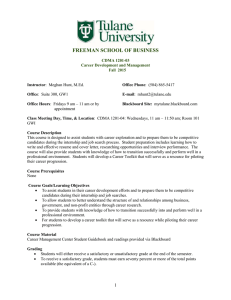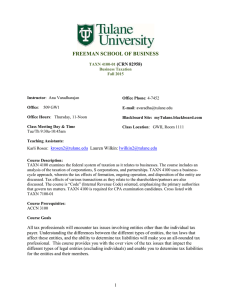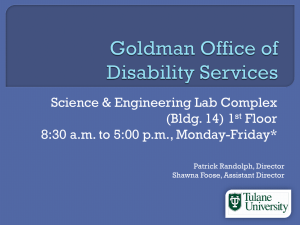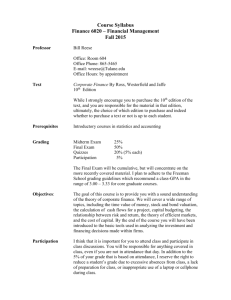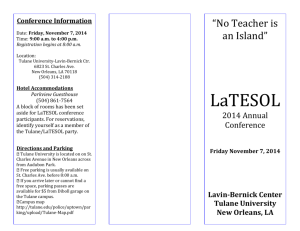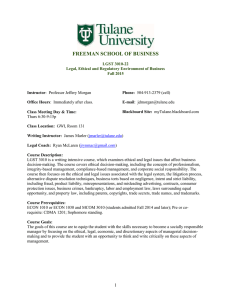INFO 3010-02_SRINIVAS - AB Freeman School of Business
advertisement
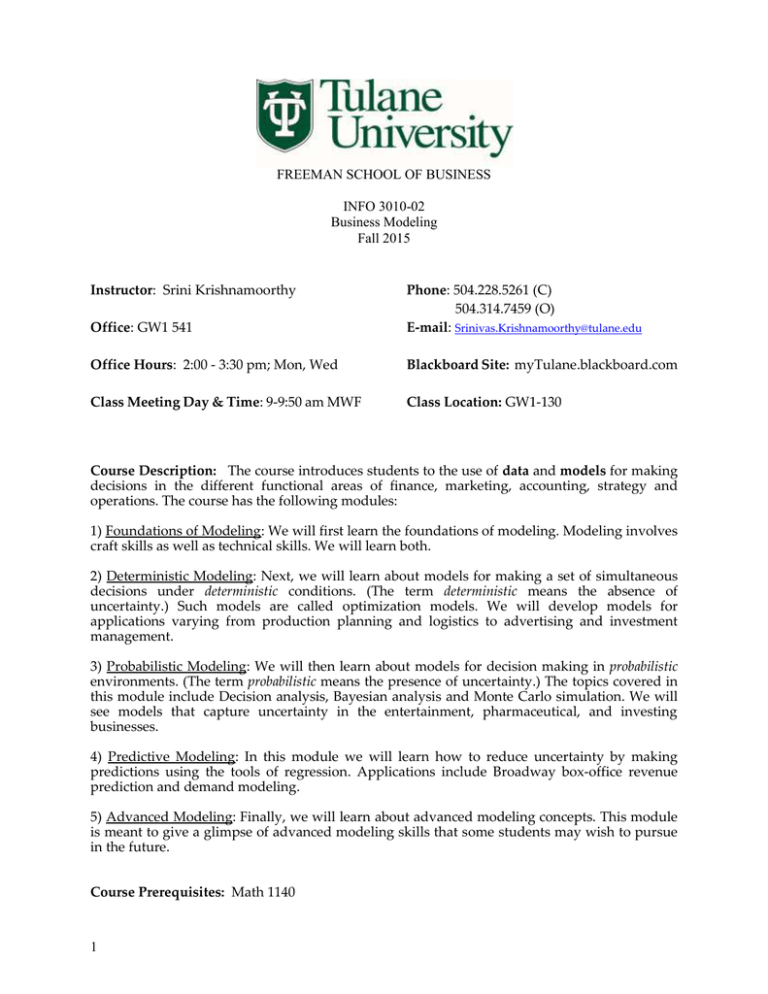
FREEMAN SCHOOL OF BUSINESS INFO 3010-02 Business Modeling Fall 2015 Instructor: Srini Krishnamoorthy Office: GW1 541 Phone: 504.228.5261 (C) 504.314.7459 (O) E-mail: Srinivas.Krishnamoorthy@tulane.edu Office Hours: 2:00 - 3:30 pm; Mon, Wed Blackboard Site: myTulane.blackboard.com Class Meeting Day & Time: 9-9:50 am MWF Class Location: GW1-130 Course Description: The course introduces students to the use of data and models for making decisions in the different functional areas of finance, marketing, accounting, strategy and operations. The course has the following modules: 1) Foundations of Modeling: We will first learn the foundations of modeling. Modeling involves craft skills as well as technical skills. We will learn both. 2) Deterministic Modeling: Next, we will learn about models for making a set of simultaneous decisions under deterministic conditions. (The term deterministic means the absence of uncertainty.) Such models are called optimization models. We will develop models for applications varying from production planning and logistics to advertising and investment management. 3) Probabilistic Modeling: We will then learn about models for decision making in probabilistic environments. (The term probabilistic means the presence of uncertainty.) The topics covered in this module include Decision analysis, Bayesian analysis and Monte Carlo simulation. We will see models that capture uncertainty in the entertainment, pharmaceutical, and investing businesses. 4) Predictive Modeling: In this module we will learn how to reduce uncertainty by making predictions using the tools of regression. Applications include Broadway box-office revenue prediction and demand modeling. 5) Advanced Modeling: Finally, we will learn about advanced modeling concepts. This module is meant to give a glimpse of advanced modeling skills that some students may wish to pursue in the future. Course Prerequisites: Math 1140 1 Course Goals: This course is designed to teach students the elements of decision making using data and models. Student Learning Objectives: As the result of this course, students should be able to: Create models for decision making Solve business problems using a structured data and models approach Communicate the insights from their models to clients/upper management Course Material: 1. There is no textbook required for the course. Paying attention in class is the best way to learn. 2. Lecture notes, problems, solutions, and other supplemental materials will be posted on Blackboard. 3. It is essential that you do the prep for every class. The prep will be on Blackboard under content. Grading: This course follows the faculty approved grading guideline of a class average GPA in the range of 2.7 to 3.0 for core classes. Your grade will be calculated using the two schemes outlined below. You will be assigned the higher of the two grades. Evaluation component 2 Individual Assignments Class Attendance Class Contribution Exam 1 (Midterm) Exam 2 (Final; not cumulative) Scheme 1 20% 5% 5% 30% 40% Scheme 2 20% 5% 10% 25% 40% Please note that each evaluation component will have an average of B which is 85%. This is to ensure that we adhere to the B average required for the course. Individual Assignments Please adhere to the deadlines for submission. Points will be deducted for late submission. Class Attendance Regular attendance at all class meetings is expected. Attendance will be taken every class. You are allowed to miss up to 2 class sessions without deduction from the attendance component of your grade. Class Contribution: The classes in this course will be interactive. You will be expected to share your business and 2 analytical perspective with your peers. This is an essential skill in any business setting. Your instructor will award you a class contribution grade based on the quality and quantity of your contributions in the course. Please bring your name tents to every class. Exams The midterm is on Sat, Oct 3rd, 10 am - 1 pm. The final is on Wed, Dec 9th, 8 am – 12 pm. The exams will be open notes. However, no laptops or cellphones will be allowed. You may bring a calculator. Statement about Academic Integrity This class will be conducted in full accordance with Tulane’s policies about academic integrity including, but not limited to, the Code of Academic Integrity and the Code of Student Conduct. These can be found at: http://tulane.edu/college/code.cfm and http://tulane.edu/studentaffairs/upload/02Academic.pdf. Freeman Educational Norms and Expectations This class will be conducted in full accordance with Freeman’s Educational Norms and Expectations. Please reread the Norms and Expectations, which can be found at http://www.freeman.tulane.edu/students/bsm/pdf/Expected%20Behavioral%20Norms.pdf. Learning Disabilities Under the Americans with Disability Act and the Section 504 of the Rehabilitation Act, if you have a disability, you may have the right to an accommodation; however, the right is contingent upon you taking certain steps. You should review the steps that you need to take, as well as Tulane’s policy concerning accommodations at http://tulane.edu/studentaffairs/disability/accommodations.cfm. Any student with a disability, in need of course or examination accommodation, should request an accommodation through the University’s Office of Disability Services (ODS) located in the Mechanical Engineering Building. At the beginning of the semester, please provide me with a copy of your approved ODS accommodation form. I am committed to working with ODS to ensure that I provide you with all approved accommodations. If you do not deliver the approved accommodation form to me, I will not know that ODS approved your accommodation and I will have no basis to provide those accommodations. PLEASE NOTE: For students with extended time accommodation, you are to take your exams within the Freeman School, please take your Exam Request Form to Suite 200 at least Four business days before the exam and the Office of Undergraduate Programs will schedule your exam. You must begin your exam when the class normally would begin. For all other accommodations, please take your form to ODS and they will schedule your exam. Specific Course Policies: Laptops: Please bring your laptop to every session. Please also note that laptops are only for 3 course related purposes. Freeman policy requires students to have Windows operating system on their laptops (http://www.freeman.tulane.edu/lib-tech/computing/tools.php). If you have a Mac, the best solution is to partition your Mac drive and install Windows, as well as Microsoft Office for Windows (http://www.freeman.tulane.edu/lib-tech/computing/mac.php). There is also a Freeman resource called CITRIX where you can access Excel for Windows, but it only works when you are inside the Freeman buildings. Blackboard: Shell files for the models will be posted on Blackboard (mytulane.blackboard.com) on the day prior to your class. Please download and skim over the shell files as part of your prep for the class. PowerPoint slides used in class by the instructor will be posted after the class; usually by the end of the day. Class Schedule: This is the planned schedule for the course modules; there may be changes based on unforeseen circumstances. Course Module Foundations of Modeling Deterministic Modeling Probabilistic Modeling Predictive Modeling Advanced Modeling Final exam review 4 Expected completion date Aug 28th Oct 2nd Nov 9th Nov 18th Nov 30th Dec 4th
